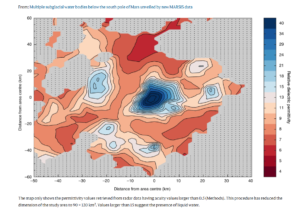Looks like Mars is positively a-swim. (Sort of.) Take a look here(1) if you haven’t heard to news.
Well… okay. Not “a-swim” not when compared to its closest neighbor (us) whose surface area is 70% free-standing water, not merely a (probably) frozen lake and some ‘puddles’ a mile under the surface(2)
I’m a little disappointed that the only “relevance” the article gives this tremendous discovery is for the search for off-planet life (though certainly that is extremely significant!). No mention that this also makes colonization way(3) more feasible now.

This is the un-exciting graph of the actual data that has caused the Hooplah. Unfortunately, I’ve been unable to find any details that must go with this graph, how the probe works, what frequencies were used, the actual location on Mars this chart covers or a table of the raw data (which would be fun to play around with), etc. That would be “real” news reporting, the way Walter, Chet and David (4) used to do it.
I have to say, I’ve lost interest (sort of) in the search for off-planet life. I mean, *of course* there’s life out there, and I’ll be *very* interested to meet some of it. However, the universe is bursting at the seams with life. Has to be. Of course there’s life on Mars (nothing complex, I suspect, unfortunately — though I gotta tell you, if you think a single celled critter is simple, you need to take another look at one!), there may well be something extraordinary in the atmosphere of Venus(5). Jupiter and Saturn are certainly a-swarm with atmospheric life forms, Neptune and Uranus less so, but they are warm(ish) from their own heat, and full of the chemicals that work so well. It’s really just not possible that they don’t have life. Larry Niven showed how Pluto and even Mercury could have life. And a quarter light year out from the sun, where our solar system has a full cloud of stuff all around it (comets and such)? Not an environment NASA would look into for life, but one I sure would.(6)
I think when the exoplanets were finally verified, and it was something that had been so very, very obvious to a certain 8 year old back in the middle 60’s (planets around other stars, that is) that it made all my other “obviousnesses” um… well… obvious. (Or something like that.) Like Spock once said (approximately), “I don’t need to see it happen know that in a positive gravity field a hammer will hit the floor when dropped.”
Life is tenacious.
Life finds a way.
The Stuff is everywhere. Trust me on that one. The only question is whether our scientists and explorers will recognize off-planet life for what it is before or after they bump their noses against it.
I’m betting it will be a bit of both.
(1) Full link is: https://www.the-scientist.com/news-opinion/discovery-of-more-ponds-on-mars-hints-at-possibility-of-life-67997
(2) Another thing I realized long before I ever saw it in the press releases is that there is an awful lot of Earth’s water is not on the surface at all. In fact, current estimates are there’s far more water under the surface (miles and miles down) than there is on the surface. My reaction when I read that was, “yeah, I thought so.” In fact, I had written the start of a horror novel once that depended quite a bit on that being the case. [No, the story was not about what you are probably thinking. 🙂 ]
(3) way, Way, WAY more feasible!! Like the traces of frozen water that have been found on the Moon now (yay!). Carting significant amounts of water from Earth would be most impractical.
(4) That’s Walter Chronkite, Chet Huntley and David Brinkley, who were, arguably (which means not necessarily, but that I believe it) representative of the last generation of real news reporters this country had. One or two exceptions, there are still a couple of honest news reporters out there, but the Herd has gone all Ginsu-Knife on us and reports adrenalin now, not events.
(5) If you haven’t heard about that, then google for “Phosphines in Venus’ atmosphere.” That one I did not see coming, I have to say. I’d been trying to imagine something that could live on that 600 degrees centigrade surface Venus sports, ever since Russia’s Venera probe discovered the surface to be that hot (1981, I think that was). That one’s tough (though I don’t think it’s impossible). The atmosphere? That’s much easier. Though I’ve been a proponent for life in Jupiter’s & Saturn’s atmospheres for several decades, it hadn’t occurred to me that Venus could pull the same trick. Silly me.
(6) NASA’s working definition of “life” is unbelievably narrow; even the notion that the water may be frozen dampens their hopes for life there. Further, when they talk about planets that may “support life” they mean life as the mainstream public understands it; life that goes to football games. Some time I may go into my thoughts about what the solar system was like in the billion (or several billion) years prior to the Sun’s igniting. I suspect that the gradually condensing cloud was very great playground for life of many sorts, before a sort of “global warming” came along (when the Sun ignited fusion inside itself for the first time) and changed every thing very quickly (probably in no more than a million years).